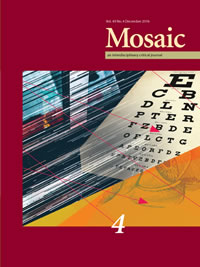Issue 49.4
Overview

General Issue
Published: December 2016
View the issue introduction or see the issue summary and contents below.
10 essays, totalling 206 pages
$21.95 CAD
Mosaic takes as its mandate the publication of interdisciplinary essays that open new research avenues. Noteworthy in this respect, the present issue brings the journal’s 2016 publication year to a fitting close. I am taken, for example, with the immediate relevance of “critical refugee studies,” a theme that is broached by this issue’s opening essay. While Alaina Kaus takes as the context for this opening essay the Vietnam War and Vietnamese diaspora in American remembrance, her study might well serve as an incentive for the interdisciplinary analysis of other wars, perhaps especially recent ones, that have been cast in American rhetoric as conflicts between good and evil. For but one other example, consider the essay by Joseph DeFalco Lamperez, another graduate student. In my reading, this is a remarkable and sophisticated exercise in interdisciplinarity, and one that no doubt invites more studies to come.
A View from the Vietnamese Diaspora: Memories of Warfare and Refuge in GB Tran’s VietnamericaAlaina Kaus This essay argues that GB Tran’s graphic memoir Vietnamerica unsettles a moralizing trend that has dominated cultural remembrance of the American War in Vietnam and its surrounding history. Castigating all nations involved, Tran’s work refuses to articulate this long period of conflict as a fight between good and evil. | |
Deleuze’s ‘Masochism’ and the Heartbreak of WaitingLorraine Markotic Gilles Deleuze’s theory of masochism insightfully illuminates Ha Jin’s novel Waiting; at the same time, Jin’s novel indicates a problem with Deleuze’s fairly rigid separation of masochism and sadism. This essay argues that Waiting supports Deleuze’s position, but also that Deleuze’s theory needs to be further developed and refined. | |
‘Yo man so what’s your story’: The Double Bind and Addiction in David Foster Wallace’s Infinite JestPaul M. Curtis This essay, contending that the double bind is the hermeneutic crux of Infinite Jest, proceeds by reviewing the origins of the phrase (Gregory Bateson), by summarizing David Foster Wallace’s use of it in his non-fiction, and by reading very closely three occasions of the phrase in the novel. | |
The Softness of Theory: A T(r)opological Reading of Lisa Robertson’s Soft ArchitectureEva Darias-Beautell This essay examines, from two different perspectives, the relationship between material and metaphoric modes of representing urban experience in Lisa Robertson’s Occasional Work: first exploring the process by which the discourse of theory is supplemented by an embodied practice; and, second, probing and testing the radical potential of this combinatory choice. | |
Universal Narrativity and the Anxious Scientist of the Contemporary NeuronovelNatalie Roxburgh, Anton Kirchhofer, and Anna Auguscik Structural features of recent neuronovels reposition narrative to complicate previous “two cultures” debates. Ian McEwan’s Saturday and Richard Powers’s The Echo Maker use cognitive science knowledge as their epistemic frames and, in different ways, reveal a “two cultures” paradox: they posit narrative as universal but also show how it is determined by particular needs. | |
Harmony Korine’s ‘Break from Reality’: Spring Breakers as Candy-Coloured Neon NoirEd Cameron Basing the analysis on Jacques Lacan’s notion of enjoyment, this essay argues that with his fifth feature Spring Breakers, filmmaker Harmony Korine has stepped beyond the reality principle to which his previous films adhere in order to create a neon-coated, oneiric film noir. | |
Ethical Spectatorship in Adrian Tomine’s ShortcomingsStella Oh This essay looks at the ways in which the burgeoning field of graphic novels contributes to the dialogue of visuality and ethics. Specifically I explore how the comic architecture of Adrian Tomine’s Shortcomings provides opportunities to rethink the ways in which one sees and is seen through surveillance. | |
Art and Life in Edith Wharton’s ‘The Muse’s Tragedy’Carl D. Malmgren By subjecting the words in the title to a closer scrutiny and examining the process of doubling in the story’s plot, this essay explores Edith Wharton’s interest in the relation between art and life in the modern world. | |
The Aztecs and Urban Form in Georges Bataille, Diego Rivera, and J. G. PosadaJoseph DeFalco Lamperez This essay examines the work of Georges Bataille, Diego Rivera, and José Guadalupe Posada. I argue that Bataille and Rivera use the Aztecs to redress modernizing reforms that impoverish the human figure and urban space alike. I then claim that both representations find expression through the calaveras of J. G. Posada. | |
Recomposing the Self: Joyful Shame in Dorothy Allison’s Bastard Out of CarolinaRachel Walerstein Dorothy Allison’s Bastard Out of Carolina is typically read as representative of the negative effects of trauma. This essay suggests that one’s shame can be used to recompose the shamed self, enabling one to (re)connect with others. |